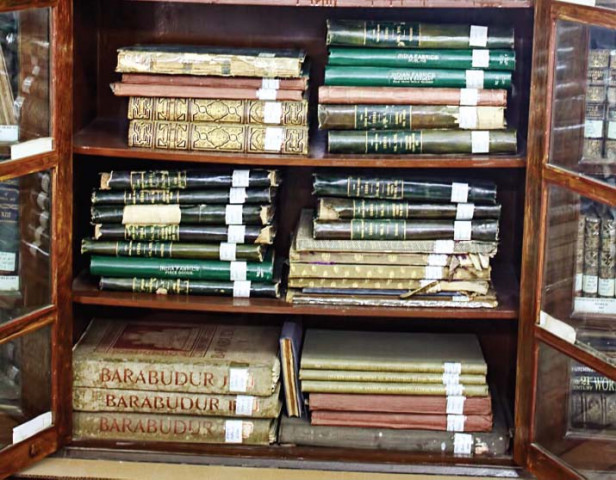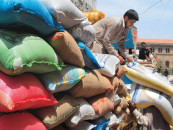Treasure trove: Awesome collection in awful condition
Rare books at Lahore Museum in jeopardy due to lack of funds, poor conservation.

The Great War chronicles the beginnings and ends of over 100,000 Indian soldiers who served in the British Army during the First World War. It notes their family and caste, date of birth, where they were born and brought up, their acts of bravery in battle, and how and when they were hurt or killed.
The 35-volume series, bound in green leather, lies locked and stacked in a cupboard in the basement of the Lahore Museum. “It is a rare collection,” says Ahmed Bashir Bhatti, the senior librarian. “There are no copies. We have many rare books.”
Such as the Textile Journals, compiled during the late nineteenth century by John Forbes Watson. They detail the various types of fabrics produced in regions of the subcontinent at the time, whether muslin from Madras or silk from the Deccan. The first print of the Archaeological Survey of India, a set of encyclopedias about the places, buildings and artifacts of the subcontinent, also lie on these shelves.
But many of these old books are crumbling, a vast store of valuable information along with them. “All the books dating to the early 19th century are fragile. They disintegrate if not held very carefully,” says Bhatti.
Forty percent of the 35,000 books in the museum’s reference library are 50 years old or more, says Bhatti. The Great Historical Geographical Genealogical and Poetical Dictionary, published in 1688, is the oldest.
The only steps taken to preserve them are fumigation, every five years, and the taping and lamination of some old books. Pages of The Oriental Catalogue of Coins, which was compiled by a museum employee named Charles Rogers and published in 1891, were joined using tape in 2004. Some pages were laminated. A hardcover binding with nails was used to hold the book together.
Conservation officer Hafiz Abdul Azeem, who has worked at the museum since 2009, says preservation techniques should be reversible. “It should not be time-bound as better preservation methods are likely to be invented in the future. A page joined with tape cannot be undone as it will rip further. Similarly, lamination prevents aeration, which leads to accelerated deterioration,” he says.
Hard binding is heavy and exerts additional pressure on already rotting pages, he says. A foreign variety of silk can be used to treat the pages, but the museum lacks the funds to import it. “Ideally, each page of an old, rare book should be treated like an artifact. Preserving a 500-page book properly can cost up to Rs100,000,” says Azeem.
Library staff are currently working on digitising the collection, a project which began in 2009. It will take another two years to finish, after which a digital copy of all the books will be passed on to the National Disaster Planning and Management Authority, which was formed in the wake of the floods, for safe keeping, says Bhatti. The books will also be made available online. Some Rs2 million was released for the project in 2010 and Rs6 million this year.
Azeem says the best way to slow the rate of deterioration of the books is to control the environmental conditions. For example, humidity should be kept low, as a high moisture content in the air encourages the growth of microbes that attack the pages.
In 2008, air conditioners were installed in the museum library, but these are often off because of power outages. There are generators, but not enough money to buy fuel for the generators, said an official.
Outsiders were not permitted into the reference library until 2002, when a membership system was started. “Limited access is provided under strict supervision as students have been caught ripping pages out,” says Bhatti. “The best we can do is watch them carefully.”
Published in The Express Tribune, July 8th, 2011.



















COMMENTS
Comments are moderated and generally will be posted if they are on-topic and not abusive.
For more information, please see our Comments FAQ